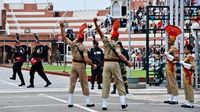In a dramatic escalation of hostilities, India launched missile strikes into Pakistani-controlled territory on the morning of May 7, 2025, resulting in the tragic death of a child and injuries to two others, according to Pakistani authorities. The Indian government asserted that the strikes were aimed at infrastructure utilized by militants, intensifying the already heightened tensions between the nuclear-armed neighbors.
These military actions come in the wake of last month’s brutal massacre of 26 tourists in Indian-administered Kashmir, an incident that India has attributed to Pakistan-backed militants, a claim that Islamabad vehemently denies. Prime Minister Shehbaz Sharif of Pakistan condemned the airstrikes, describing them as cowardly attacks and asserting that Pakistan would respond robustly. “The deceitful enemy has carried out cowardly attacks at five locations in Pakistan,” Sharif stated, emphasizing his country’s right to retaliate. “A strong response is indeed being given,” he added, indicating that the Pakistani military is prepared to confront the perceived aggression.
The missile strikes reportedly targeted multiple sites in Pakistan-administered Kashmir and the eastern Punjab province. Notably, one missile hit a mosque in Bahawalpur, resulting in the death of a child and injuring a woman and a man. In response to the airstrikes, Pakistan Television reported that the Pakistani air force successfully shot down two Indian jets, although further details on this claim were not provided.
Pakistan's Foreign Affairs Ministry has stated that Indian forces executed these strikes while remaining within Indian airspace, impacting locations near Muridke in Punjab and Kotli in Pakistan-controlled Kashmir. The Ministry described the attacks as reckless, leading to civilian casualties and posing a significant threat to commercial air traffic. “This reckless escalation has brought the two nuclear-armed states closer to a major conflict,” the statement read.
On the Indian side, the Defense Ministry confirmed that at least nine sites were targeted, which they claim were locations where terrorist attacks against India had been planned. “Our actions have been focused, measured and non-escalatory in nature. No Pakistan military facilities have been targeted,” the Ministry asserted, adding that India has exercised considerable restraint in its choice of targets and methods of execution. “We are living up to the commitment that those responsible for this attack will be held accountable,” the statement concluded.
In the aftermath of the missile strikes, Sharif convened a meeting of the National Security Committee to address the situation. Meanwhile, Stephane Dujarric, spokesperson for the United Nations, expressed concern over the Indian military operations across the Line of Control and called for maximum restraint from both nations. “The world cannot afford a military confrontation between India and Pakistan,” he stated.
Residents in Muzaffarabad, the main city of Pakistan-administered Kashmir, reported hearing multiple explosions, which resulted in panic and a power blackout in the area. Waqar Noor, the region’s interior minister, announced that emergency measures had been enacted in local hospitals to deal with the influx of casualties.
This latest conflict is not an isolated incident but part of a long-standing history of military confrontations between India and Pakistan, particularly over the disputed region of Kashmir. The roots of this conflict trace back to 1947, when both countries gained independence from British colonial rule. Almost immediately, they found themselves at war over Kashmir, a territory both claim but neither fully controls. The United Nations intervened in 1949, establishing a ceasefire line that has since been a flashpoint for violence.
Subsequent conflicts occurred in 1965 and 1971, with the latter resulting in the secession of East Pakistan and the creation of Bangladesh. The Kargil War in 1999 marked a significant escalation, as both nations had acquired nuclear capabilities by that time, raising fears of a catastrophic conflict. In more recent years, incidents such as the 2016 Uri attack and the 2019 Pulwama attack have led to military responses from India, including surgical strikes and air raids on alleged militant camps in Pakistan.
Adding to the tension, the Attari-Wagah border crossing point between India and Pakistan was officially closed on May 1, 2025. This closure followed India's decision to revoke visas and suspend visa services to Pakistani citizens after the attack on tourists near Pahalgam in Kashmir. The Attari-Wagah border has historically been a site of theatrical military displays and a symbol of the complex relationship between the two nations. However, with the border now closed, the daily exchange of pageantry has come to a halt, leaving behind an atmosphere of uncertainty and fear.
Despite the closure, the Beating Retreat ceremony, performed by Pakistani Rangers at the border gates on May 4, 2025, served as a reminder of the once-vibrant interactions between the two countries. The ceremony, which has attracted tourists for years, reflects a desire for peace amidst ongoing conflict.
As the situation continues to unfold, both nations find themselves at a critical juncture. With military operations escalating and diplomatic avenues seemingly closing, the international community watches closely, hoping for a de-escalation of tensions that could lead to renewed dialogue and peace.





